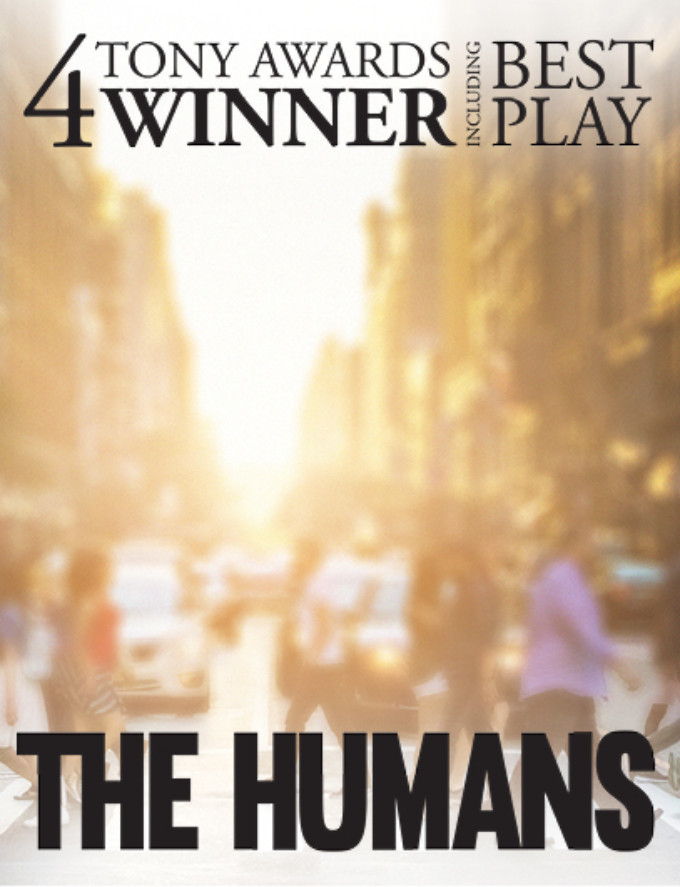Review: THE HUMANS at Geva Theatre

Plays examining intimate family dynamics are hardly new. From Eugene O'Neill's iconic Long Day's Journey Into Night to Sam Shepard's Buried Child to the newer Making God Laugh, families and their peculiarities certainly make excellent fodder for the stage. Stephen Karam's 2016 play The Humans-- currently playing at Rochester's Geva Theatre-- is one of the most recent works to join this storied genre, and it's one rife with subtlety and subtext, humor and sorrow. It makes me glad Karam didn't use my family as his muse; I don't think we're Tony Award material.
The Humans is the portrait of a seemingly average American middle class family as they gather in the New York City apartment of Brigid (Regan Moro)--one of the family's daughters--to celebrate Thanksgiving together. Erik Blake (Skip Greer, Geva's Artist in Residence) and Deirdre Blake (Toni diBuono) arrive from their home in Scranton, Pennsylvania, to have dinner with Brigid, Richard (Thamer Jendoubi) and Aimee (Madeline Lambert), their other adult daughter. Brigid is a musician and Aimee is a lawyer living in Philadelphia. Aimee has recently broken up with her girlfriend and has developed an intestinal ailment. Also present is Erik's mother "Momo" (Susanne Marley), who has Alzheimer's disease. The parents are unhappy that their daughters have left home and have abandoned their religion, and are likewise unhappy that Brigid and her boyfriend Richard are living together before marriage. While the play is short (90 minutes) and is presented in real-time, encompassing only the family's arrival, dinner, and post-dinner, the Blakes confront issues including aging, illness, religion, sin, money, forgiveness, and the fact that we're all...well...human.
While there's plenty to gush over in Geva's excellent production of this modern masterpiece, the way in which this cast captures the essence of the modern American family is its finest achievement. I lost count of how many times my wife and I gave each other chuckling side-eye or muttered "Erik is JUST like your Dad", "you were JUST like Richard when we started dating", etc. I suspect many audience members had similar reactions, both because Karam wrote characters that are infinitely relatable and because this production's cast brought those characters to life in the most organic and relevant way. Crafting relatable characters was certainly the point, because Karam uses these characters to deliver the show's main thesis: between unaffordable healthcare, economic instability, and cultural de-religioning, the American dream is a shifting, unattainable phantom.
The cast-combined with Mark Cuddy's excellent direction-sets a pace that anyone who has ever attended a large family gathering will recognize. Constant interruptions, people zipping up-and-down stairs, spills, arguments, and never-ceasing dialogue make the audience feel like a fly on the wall at the annual Thanksgiving dinner or Christmas party. It was a source of PTSD for me-someone who comes from a small, quiet suburban household-as I recalled what it was like when I first starting coming to dinner at the house of my now-wife-who has an enormous, constantly buzzing family.
The brilliance of this play, and likely what made it both Tony and Pulitzer worthy (a finalist for the 2016 Pulitzer Prize for Drama and won the 2016 Tony Award for Best Play) derives from its subtlety; the devil really is in the details, with some of the meatiest exchanges occurring via quick barbs and snipes between mother and daughter, sister and sister, husband and wife. The Humans-while on its surface might appear to be a prototypical family drama-also asks the audience to look a layer under the surface, as the subtext of the story is far heavier than sibling rivalries and marital tiffs. Erik, despite being a seemingly hard worker, downplays money problems and is bitter with resentment toward Richard's trust fund, becoming the poster boy for the economic frailty of the middle-class. Deidre blindly adheres to religious orthodoxy and is disheartened at her daughters' loss of faith. Indeed the entire show has religious overtones; between Erik's cryptic dreams, the ever-present Virgin Mary statue, and the constant banging from overhead acting as a celestial drumbeat toward death. The Humans walks a tightrope between relatable family drama and religious/socioeconomic allegory in a way that I cannot communicate in words; you'll just have to go see it.
Geva's production of The Humans is an acting masterclass from all six performers, but the true titan is Skeep Greer, who commands the stage from the moment he enters it. Greer is EVERYONE'S Dad; telling corny jokes, criticizing the crown molding, yapping about the "big game". And just when you think you have him figured out as the simple yet loveable patriarch he ratchets up the intensity, bears his soul and rips his heart out. He is astounding.
Geva Theatre's production of The Humans is equal parts funny, heartwarming, and raw. It's a once-in-a-generation show that will be in your head for days after the curtain drops. It's playing on Geva Theatre's Wilson mainstage until March 17th. For tickets and more information, click here.
Reader Reviews

Videos

